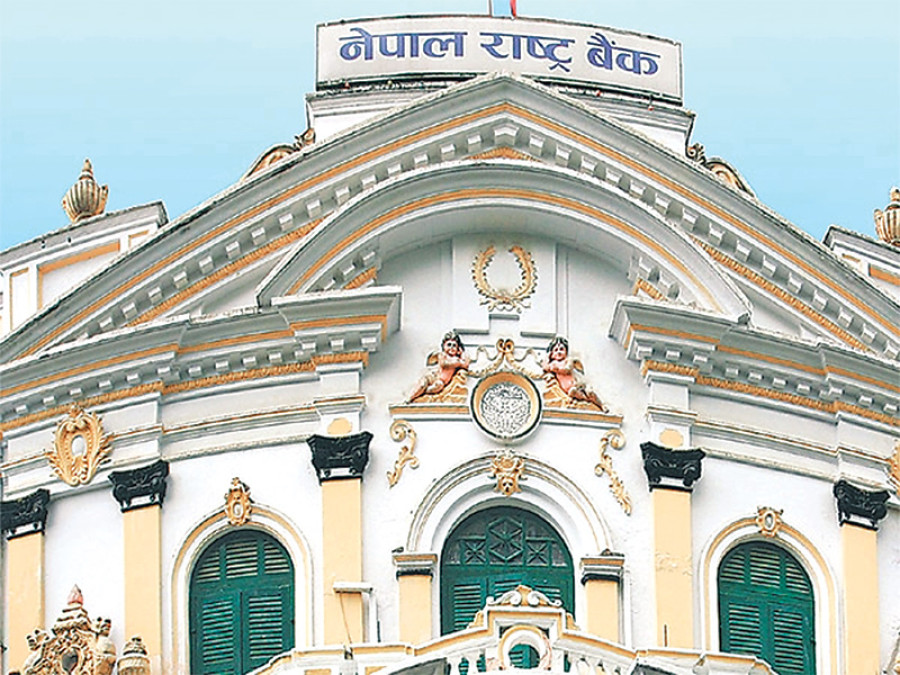Money
NRB forms panel to discuss change in retirement policy
A trade union at the Nepal Rastra Bank (NRB), the central bank, has called off its protest programme after the management formed a new committee comprising representatives of employees’ unions to recommend whether an amendment to the bank’s compulsory retirement policy is necessary.
A trade union at the Nepal Rastra Bank (NRB), the central bank, has called off its protest programme after the management formed a new committee comprising representatives of employees’ unions to recommend whether an amendment to the bank’s compulsory retirement policy is necessary.
The Nepal Financial Institutions Employees Association (NFIEA), a trade union close to the Nepali Congress, had warned to picket the Governor’s Office and district offices of the NRB for an hour from 10 am to 11 am beginning Monday. The warning was issued after the NRB’s top brass pushed to introduce a provision that would allow employees to work even after they complete 30 years of service. The call made by the trade union had also received support of other unions at the bank.
“We have now decided not to picket district offices of the NRB as a committee has been formed to address our concerns. We also took this decision as branch offices of the NRB have to be engaged in works like distribution of fresh banknotes ahead of the Dashain festival. And we don’t want to create problems for the public,” NFIEA General Secretary Rajiv Regmi said. “But we are yet to take a decision on whether to cancel our plan to picket the Governor’s Office.”
The three trade unions at the NRB-Nepal Rastra Bank Employees’ Association, which is close to the Communist Party of Nepal-United Marxist Leninist (CPN-UML), National Employees Organisation, which is close to the Communist Party of Nepal (Maoist Centre), and the NFIEA-are meeting on Tuesday morning to take a decision on the matter.
The NRB, on Monday, formed a committee under its deputy governor Chinta Mani Siwakoti to discuss whether an amendment to the bank’s compulsory retirement policy is necessary. The committee comprises another deputy governor, Shiba Raj Shrestha, Narayan Prasad Paudel, head of the Banks and Financial Institutions Regulation Department at the NRB, and one representative each from three trade unions at the NRB.
The committee has been given 15 days to submit a report.
This is not the first time the NRB has formed a committee to weigh the pros and cons of changing the provision on compulsory retirement after 30 years in service.
During the time when Yuba Raj Khatiwada was the governor, a committee was formed under NRB board member Ram Hari Aryal to address this issue. But it couldn’t. The issue was then forwarded to NRB’s board, but it also couldn’t address the issue.
Later, a three-member committee was formed under Parthiveshwor Timilsina, former NRB board member, to look into this matter. The report submitted by the
committee has not been made public.
Then, a year ago, Bimal Wagle was hired to look into this issue. Wagle is said to have recommended that the NRB should not remove the provision on compulsory retirement after 30 years of service.
Since the recommendation was not what the NRB top brass had expected, the management formed another committee under its board member Ramjee Regmi. The committee recommended that the NRB should scrap the provision on compulsory retirement after 30 years in service.
Following this, NRB governor and deputy governors are pushing to arbitrarily amend the retirement policy.
“We don’t support any move that does not justify the cause of prolonging the tenure of staff at the NRB,” Regmi said.
At present, NRB staff must retire after 30 years in service or after reaching the age of 58, whichever comes first. If the advice of the NRB top brass is heeded, all employees at the central bank will be able to work till they reach 58, regardless of when they joined the institution. This implies people, who joined the NRB at the age of, say, 20, can serve the institution till the time they reach 58, taking up the
number of years in service to 38, as against the current provision of 30.
This change in retirement policy, many at NRB say, will allow “older and especially unproductive staff” to continue working for the central bank, thereby reducing intake of “younger, smarter and techno-savvy” people. This will also bar competent young employees from climbing the rungs of career ladder at a desired pace, as most of the senior posts would be occupied by older employees.




 9.7°C Kathmandu
9.7°C Kathmandu














